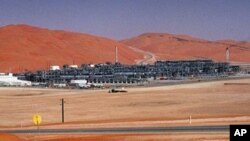Top global oil exporter Saudi Arabia raised its crude production in April to a record high, feeding its flourishing Asian market share and its own power plants and refineries
The world's top oil exporter pumped 10.308 million barrels of oil per day in April, a Gulf industry source told Reuters on Tuesday, compared to 10.29 million bpd in March.
"This is an indication of strong demand, especially from Asia, as well as increasing domestic consumption during summer," the source said.
The increase underlined Saudi Arabia's determination not to cede market share to higher-cost producers, such as U.S. shale drillers. The kingdom and others in the Organization of Petroleum Exporting Countries (OPEC) had resisted cutting production to shore up oil prices.
It also highlights the strength of global demand, which has helped lift refinery profit margins to their highest in years.
Oil Minister Ali al-Naimi has said the kingdom's output would likely remain around 10 million bpd, and that he was "very positive" about Asian oil demand outlook.
The amount of crude supplied to the market in April was 10.360 million bpd, the source said. Supply to the market, both domestically and for export, may differ from production depending on the movement of oil in and out of storage.
Records back to the 1980s
April's output eclipsed the previous recent peak of 10.2 million bpd in August 2013, according to records going back to the early 1980s.
Last week, a senior Gulf OPEC delegate told Reuters the rise in oil prices has been supported by stronger-than-expected demand growth and a slowdown in crude supply, and is likely to continue into the second half of this year.
A rally driven by Middle East conflict and signs the supply glut could ease pushed Brent crude to a 2015 high of $65.31 a barrel on Tuesday, up from $45 in January. Oil prices more than halved last year after reaching $115 a barrel in June.
Saudi Arabia burns more crude to generate power for air conditioning heading into the summer months. It has also been feeding more crude to domestic refineries as it expands its oil products exports.
Direct use of crude last year rose from around 350,000 bpd in March to nearly 900,000 bpd in July, according to the Joint Oil Data Initiative database.
In February 2015, it burnt 315,000 bpd for power generation and domestic refiners processed 2.084 million bpd of crude.





